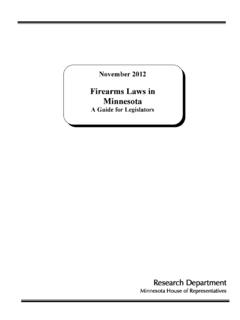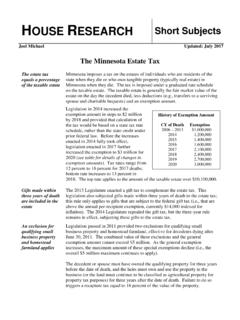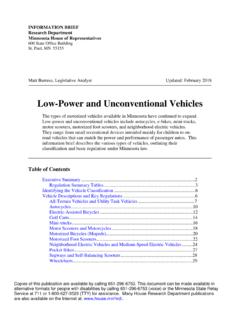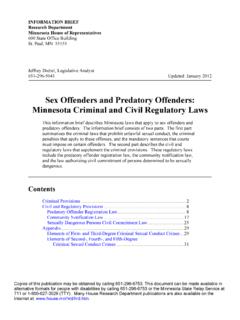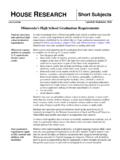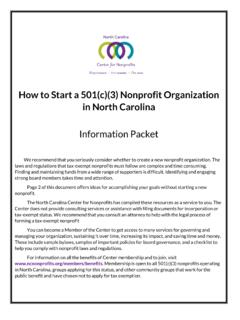Transcription of Minnesota Open Meeting Law - 83rd Minnesota Legislature
1 INFORMATION BRIEF. Research Department Minnesota House of Representatives 600 State Office Building St. Paul, MN 55155. Deborah A. Dyson, Legislative Analyst Revised: July 2017. Minnesota open Meeting Law The Minnesota open Meeting Law requires that meetings of governmental bodies generally be open to the public. This information brief discusses the groups and types of meetings covered by the open Meeting law, and then reviews the requirements of and exceptions to the law and the penalties for its violation. Contents Executive Summary ..2. Groups and Meetings Governed by the open Meeting Law ..3. Requirements of the open Meeting Law ..7. Exceptions to the open Meeting Law ..9. Penalties ..14. Advice ..15. Copies of this publication may be obtained by calling 651-296-6753. This document can be made available in alternative formats for people with disabilities by calling 651-296-6753 or the Minnesota State Relay Service at 711 or 1-800-627-3529 (TTY).
2 Many House Research Department publications are also available on the Internet at: House Research Department Revised: July 2017. Minnesota open Meeting Law Page 2. Executive Summary The Minnesota open Meeting Law was originally enacted in Laws 1957, chapter 773, section 1. It is now codified in Minnesota Statutes, chapter 13D. The Minnesota Supreme Court has articulated three purposes of the open Meeting law: To prohibit actions being taken at a secret Meeting where it is impossible for the interested public to become fully informed about a public board's decisions or to detect improper influences To assure the public's right to be informed To afford the public an opportunity to present its views to the public body 1. These purposes are deeply rooted in the fundamental proposition that a well-informed populace is essential to the vitality of our democratic form of government. 2 Courts interpret the law liberally and in favor of openness.
3 Entities covered by the law. The law applies to state and local multimember governmental bodies, including committees and subcommittees, and nonprofits created by political subdivisions. A separate law applies to the Legislature . Situations where the law applies. A Meeting is a Meeting for purposes of the law when a quorum or more of the governmental body is gathered in person or by electronic means, whether or not action is taken or contemplated. The open Meeting law does not address whether the governmental body must keep or publish Meeting minutes, hold a Meeting for a particular purpose, or allow members of the public to address the body. For any particular governmental body, there may be other laws or charter provisions that address those topics. What constitutes an open Meeting . A Meeting is open when proper notice was given in advance of the Meeting , the public may attend and observe, and relevant materials are available to the public.
4 Exceptions to the law. A Meeting may be closed based on a limited attorney-client privilege, and for the purposes of labor negotiations, employee evaluations, and discussion of security issues and property transactions. The law does not apply to a governmental body exercising quasi-judicial functions involving disciplinary proceedings. 1. Prior Lake American v. Mader, 642 729, 735 (Minn. 2002) (en banc) (citing St. Cloud Newspapers, Inc. v. District 742 Community Schools, 332 1, 4 (Minn. 1983)). While the courts consistently say that the open Meeting law is to afford the public an opportunity to present its views to the public body, there is no general right for members of the public to speak at a Meeting . Some statutes, and perhaps some home rule charters, specify that a hearing on a particular matter must be held at which anyone who wishes to address the public body may do so. See, , Minn. Stat. , subd. 2. 2. Prior Lake American, 642 at 735.
5 House Research Department Revised: July 2017. Minnesota open Meeting Law Page 3. Violations of the law. While actions taken at a Meeting held in violation of the law are still valid, the law provides for penalties and potentially removal from office. Where to get advice. A governmental entity can seek advice from its attorney, the Minnesota Attorney General, or the Commissioner of Administration. An individual may seek advice from a private attorney or the Commissioner of Administration. Groups and Meetings Governed by the open Meeting Law The law applies to all levels of state and local government. The open Meeting law applies to: a state agency, board, commission, or department when it is required or permitted by law to transact public business in a Meeting ;. the governing body of any school district, unorganized territory, county, city, town, or other public body;. a committee, subcommittee, board, department, or commission of a public body subject to the law; and the governing body or a committee of a statewide or local public pension plan.
6 3. Public body is not defined but the Minnesota Supreme Court has stated that [i]n common understanding, public body' is possibly the broadest expression for the category of governmental entities that perform functions for the public benefit. 4. In determining whether the open Meeting law applies to a particular entity, one should look at all of the entity's characteristics. For example, in a 1998 case, the Minnesota Supreme Court held that because the statute authorizing creation of a municipal power agency authorized an agency to conduct its affairs as a private corporation, it could hold closed meetings. 5 The court held so notwithstanding the statute that provides for municipal power agencies to be political subdivisions of the state. 6. 3. Minn. Stat. , subd. 1. 4. Star Tribune Co. v. University of Minnesota Board of Regents, 683 274, 280-282 (Minn. 2004) (en banc). 5. Southern Minn. Mun. Power Agency v. Boyne, 578 362, 364 (Minn.)
7 1998) (en banc) (citing Minn. Stat. , subd. 21, and discussing the factors that distinguish a public corporation from a private corporation). See also Minnesota Joint Underwriting Ass'n v. Star Tribune Media Co., 862 62, 65 (Minn. 2015). (discussing Boyne; stating whether a particular entity is a government entity under the Data Practices Act is a question of law subject to the court's de novo review). 6. Minn. Stat. , subd. 1, para. (b), cl. (1) (The agency agreement shall state: (1) That the municipal power agency is created and incorporated .. as a municipal corporation and a political subdivision of the state, to exercise thereunder a part of the sovereign powers of the state; ). House Research Department Revised: July 2017. Minnesota open Meeting Law Page 4. The law generally applies to nonprofit corporations created by governmental entities. The list of groups covered by the open Meeting law does not refer to nonprofit corporations created by a governmental entity.
8 However, the law creating a specific public nonprofit corporation may specify that it is subject to the open Meeting law. 7 In addition, any corporation created by a political subdivision before May 31, 1997, is clearly subject to the open Meeting law. 8. Gatherings of less than a quorum of a public body are not subject to the law; a Meeting . is held when the group is capable of exercising decision-making powers. The Minnesota Supreme Court has held that the open Meeting law applies only to a quorum or more of members of the governing body or a committee, subcommittee, board, department, or commission of the governing body. 9 Serial meetings in groups of less than a quorum held in order to avoid open Meeting law requirements may also be found to be a violation, depending on the facts of the case. 10. A public body subject to the law should be cautious about using e-mail to communicate with other members of the body. Although the statute does not specifically address the use of e-mail, it is likely that the court would analyze use of e-mail in the same way as it has telephone conversations and letters.
9 11 That is, private communication about official business through 7. , Minn. Stat. , subd. 6 ( Minnesota Risk Adjustment Association); , subd. 6 (Lake Superior Center Authority); , subd. 10 (Agricultural Utilization Research Institute); , subd. 4. ( Minnesota Commission on National and Community Service may create a nonprofit but it is subject to the open Meeting law); and (State High School League). 8. Minn. Stat. , subd. 9. 9. Moberg v. Independent School Dist. No. 281, 336 510 (Minn. 1983) (en banc). 10. Id. at 518; see also Mankato Free Press Co. v. City of North Mankato, 563 291, 295 (Minn. App. 1997). On remand to the district court for a factual finding on whether the city used serial interviews to avoid the open Meeting law, the trial court found, and the court of appeals affirmed, that the serial meetings were not held to avoid the law. Mankato Free Press Co. v. City of North Mankato, No. C9-98-677, 1998 WL 865714 (Minn.)
10 App. 1998) (unpublished opinion), review denied (Minn. Feb. 24, 1999). 11. Moberg, 336 at 518. The Commissioner of Administration stated in a July 9, 2008, opinion that an e-mail sent to all members of a city council by the city manager was effectively printed material that should be available to members of the public and also suggested that the Legislature revise the statute to recognize the use of electronic and other types of communications. Minn. Dept. of Admin. Advisory Op. 08-015. A September 8, 2009, opinion by the commissioner states that the exchange of e-mails by staff and members of the Metro Gang Strike Force Advisory Board violated the open Meeting law because it was not just a matter of a quorum receiving information, but a quorum of the body discussing and then giving the staff person direction on the action to take. In June 2017, the Commissioner of Administration issued an opinion that a letter signed by a quorum of a school board that was sent without public notice, or discussion and decision on the substance of the letter in an open Meeting violated the law.

